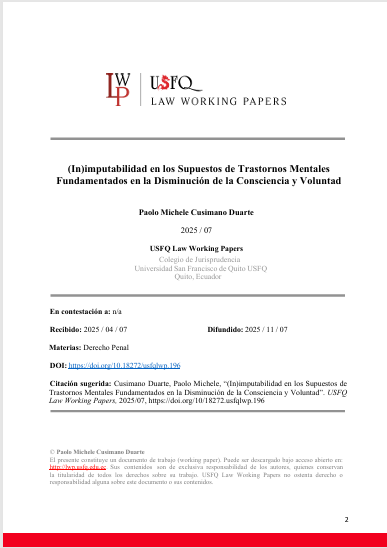(Non) liable in cases of mental disorders based on diminished consciousness and volition.
DOI:
https://doi.org/10.18272/usfqlwp.196Keywords:
Criminal law, liability, non-liability, partial liability, mental disorders, consciousness, volitionAbstract
This paper analyzes the concept of (non) liability in cases involving mental disorders, focusing on how consciousness and volition influence criminal accountability. It examines Ecuadorian legislation and legal doctrine concerning non-liability, partial liability, and transitory mental disorders. The analysis reveals significant ambiguities in Ecuadorian law, particularly regarding mental disorders and transitory conditions, which complicate its proper application in criminal proceedings and create legal uncertainty. The study concludes that it is essential to clarify and codify the concepts of non-liability and partial liability, as well as to establish specific regulations for transitory mental disorders. Furthermore, it advocates for public policies aimed at strengthening specialized institutions, such as forensic psychiatry, and providing training for justice system operators on these concepts. These measures are intended to ensure proper application of the law, safeguard fundamental rights, and enhance legal security within Ecuador's criminal justice system.

Downloads
Posted
License
Copyright (c) 2025 Paolo Michele Cusimano Duarte

This work is licensed under a Creative Commons Attribution-NonCommercial 4.0 International License.
